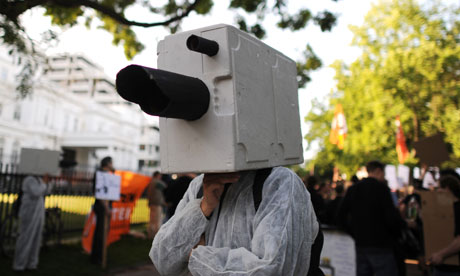
Science fiction marks the point where the artistic project to understand the human condition meets the scientific project to transform it. It's arguably the one discipline in the liberal arts and humanities properly equipped to talk about the technological revolution creating the future. I've read SF for my entire life, because it's the only reliable guide I've found to the weird present we're now all living in. But its specific predictions of the future are often wildly inaccurate.
It's 2013 and there are no bases on Mars or even Luna. We aren't exploring the galaxy at warp speed and, given the impossibility of faster-than-light travel, we never will be. Even less probable is an artificially intelligent computer, being in the scheme of things about as likely as an AI pencil case. But SF has never been about specific predictions. Its real value, like most art, is in the deeper meaning of its metaphors. So where has SF succeeded in helping us understand the present?
HAL 900 and Skynet may not be rising up just yet, but algorithms are already secretly ruling the world. They are driving financial transactions, selecting candidates for their future careers, marketing products to us and, as PRISM revealed, determining if we present a threat to national security. The terrifying reality of machines ruling our lives is not that they are intelligent, but that they are not intelligent. Artificial Unintelligence is the threat that SF failed to predict, along with our willingness to hand over quite so much power to unconscious systems.
If that's making you think of Big Brother then you have George Orwell's science fiction masterpiece 1984 to thank. We're able to perceive the totalitarian threat of Microsoft placing a 3D scanning device in every living room because of the eerie echoes of Orwell's novel. And indeed dozens of other dystopian masterpieces, from Brave New World to The Handmaid's Tale, that SF has provided to warn of technology's darker side.
If we've avoided an Orwellian state so far, it's arguably only because we're so good at oppressing ourselves in pursuit of material wealth. Golden Age science fiction predicted that technology would satisfy all our material needs, and in many ways it has. Mass production and then automation mean that our food, cars and Nike trainers are made for near-negligible cost. It takes a massive industry of marketeers and ad execs to keep us paying top dollar for tat. But the more cynical vision of Frederik Pohl and Cyril M Kornbluth in The Space Marchants comes closer to the reality of today, where corporate interests and basic human greed keep us trapped in economic scarcity long after we might have escaped it.
Far be it from me to make any claims to psychic powers, but in the last 24 hours I've plucked thoughts from the minds of hundreds of other humans in 140-character bites and read dozens of news stories published only minutes before they hit my mind. Octavia E Butler's Patternist novels are a speculative vision of psychic powers operating between human minds, and it's remarkable how many parallels to the internet are to be found there and in other SF tales of psychic powers like Alfred Bester's The Demolished Man. We may not have reached the full Vulcan mind-meld just yet, but our smartphone obsession is not a million light years away from it.
It's been a full century since quantum mechanics and relativity theory changed our basic understanding of the universe, but most of us are still live our daily lives as though they operated with the clockwork certainty of Newtonian physics. The emerging literary genre of Quantum Fiction tries to shift our scientific understanding into the human realm, and includes novels by Audrey Niffeneger, Douglas Adams and Scarlett Thomas. A list to which I would add M John Harrison's Kefahuchi Tract trilogy, that takes us on a journey across space and time, only to return us to the point where our dreams and flights of imagination impact with the quantum foam at the root of reality.
Algorithmic robot overlords. Microsoft Big Brother. Post-Scarcity economics. Psychic powers. Quantum reality. there are some wild ideas in science fiction. For a world going wild with technology, they may be the most realistic literature around.

